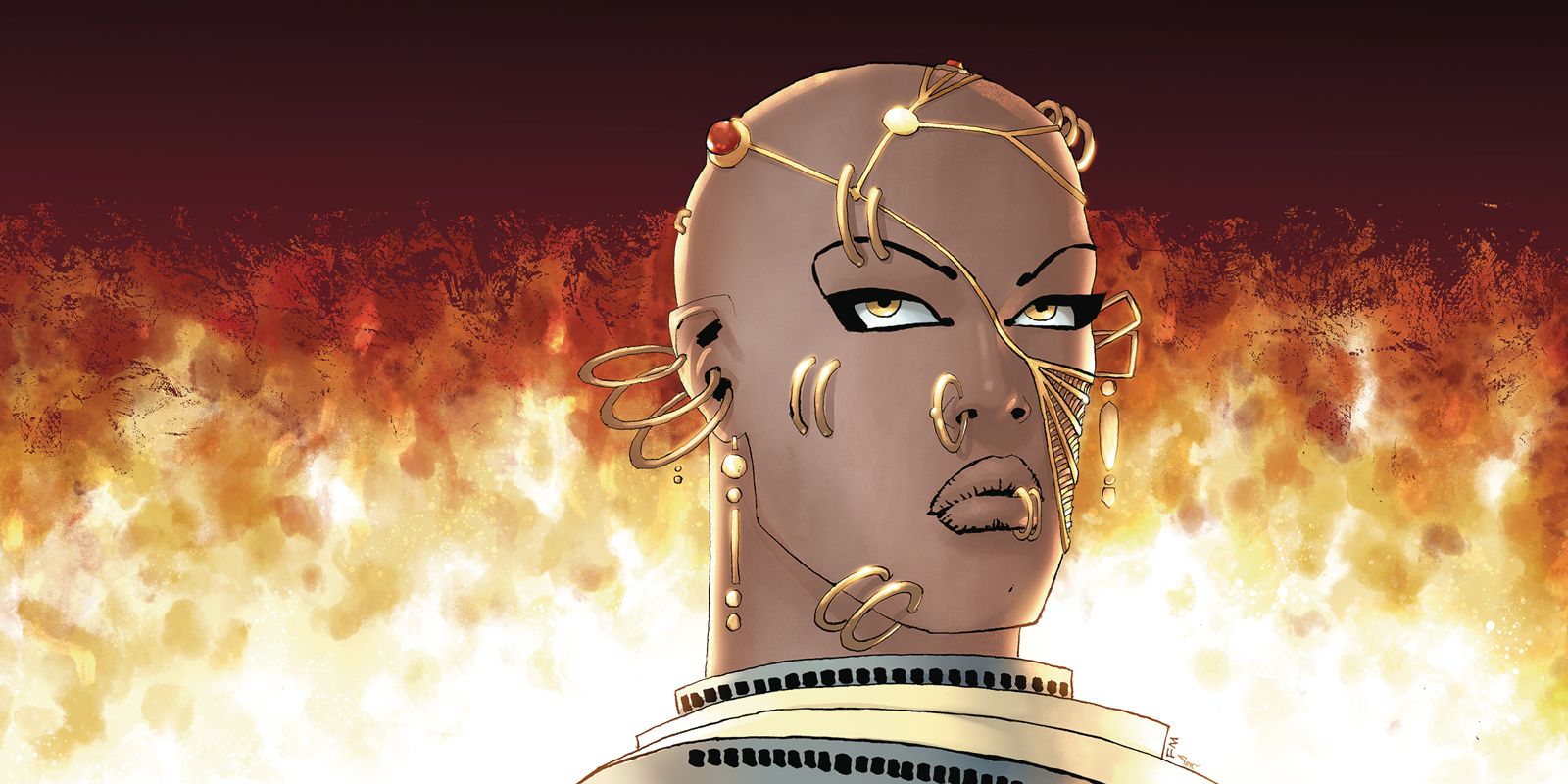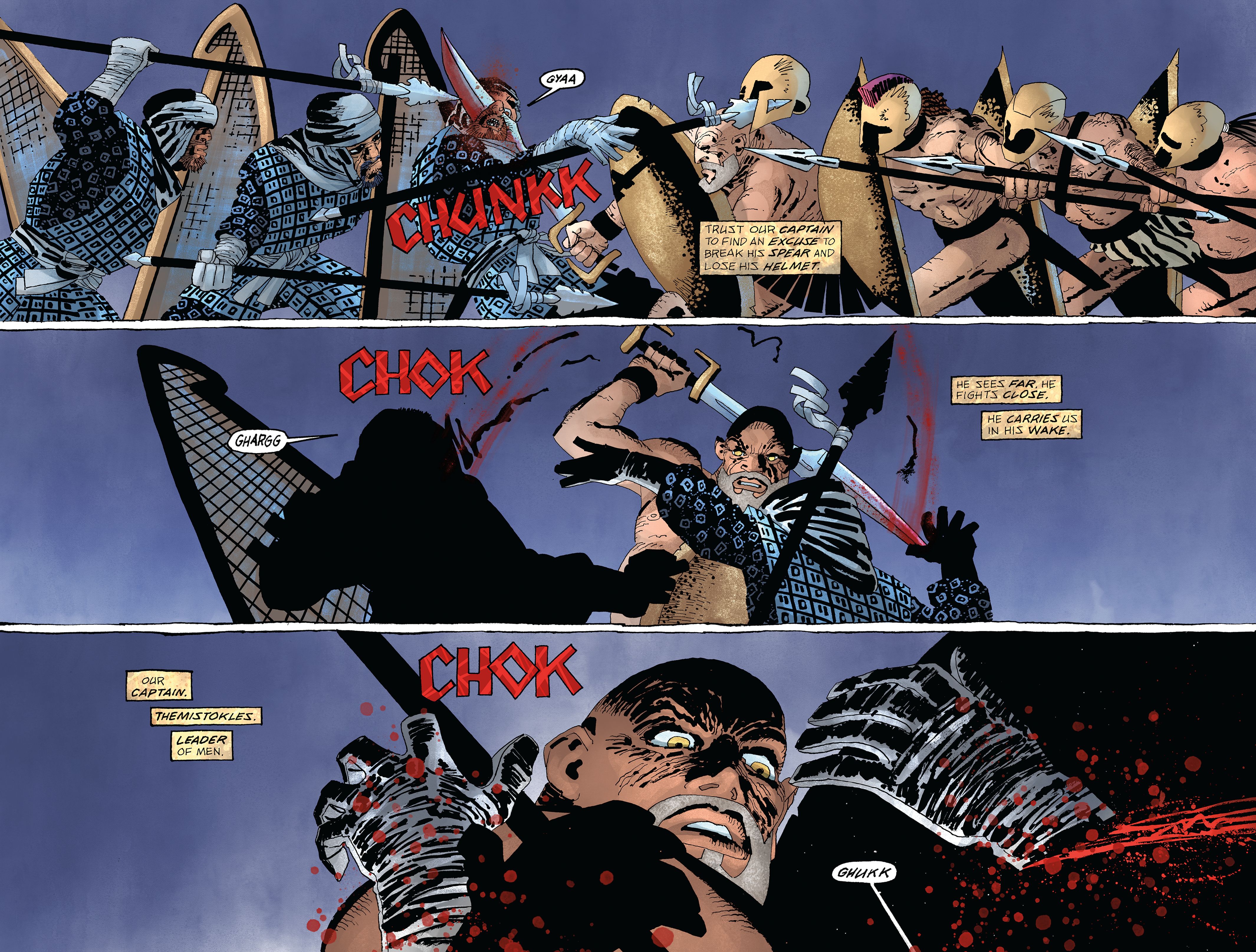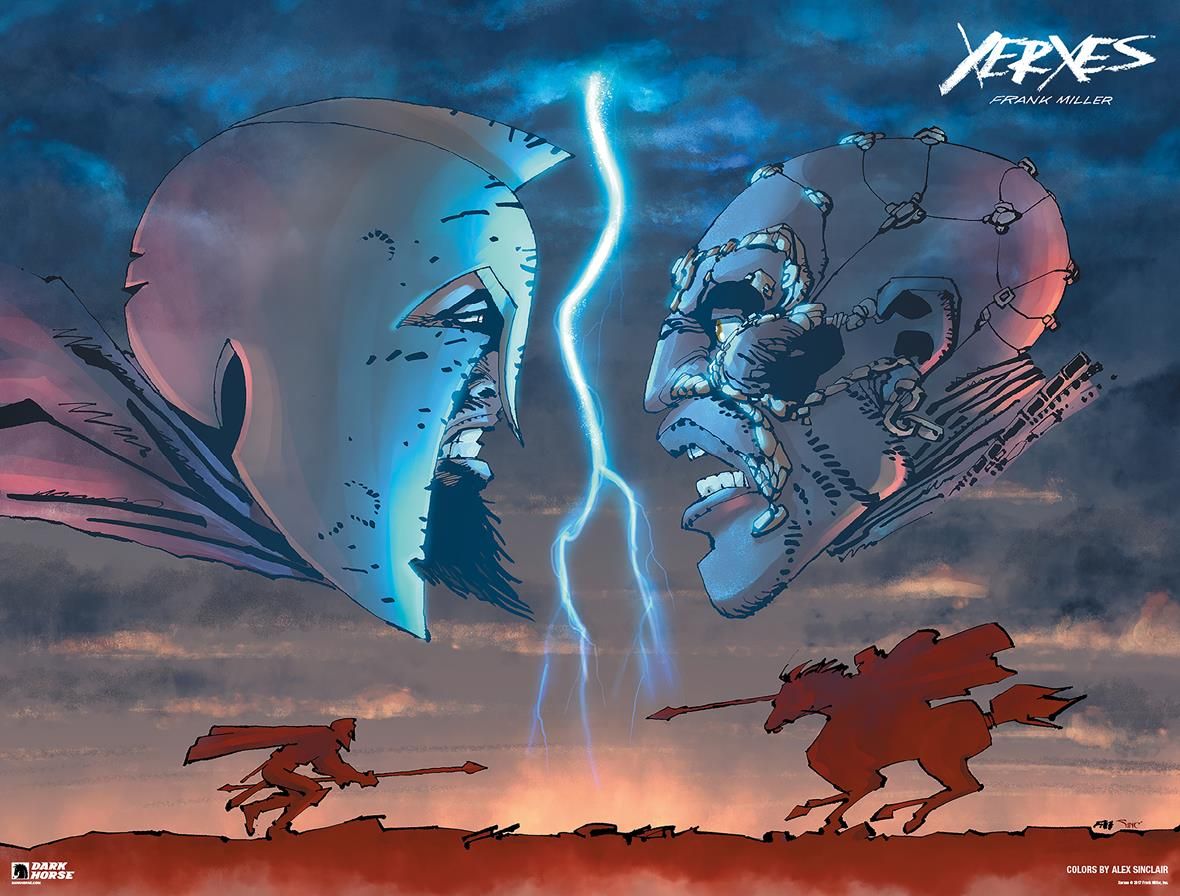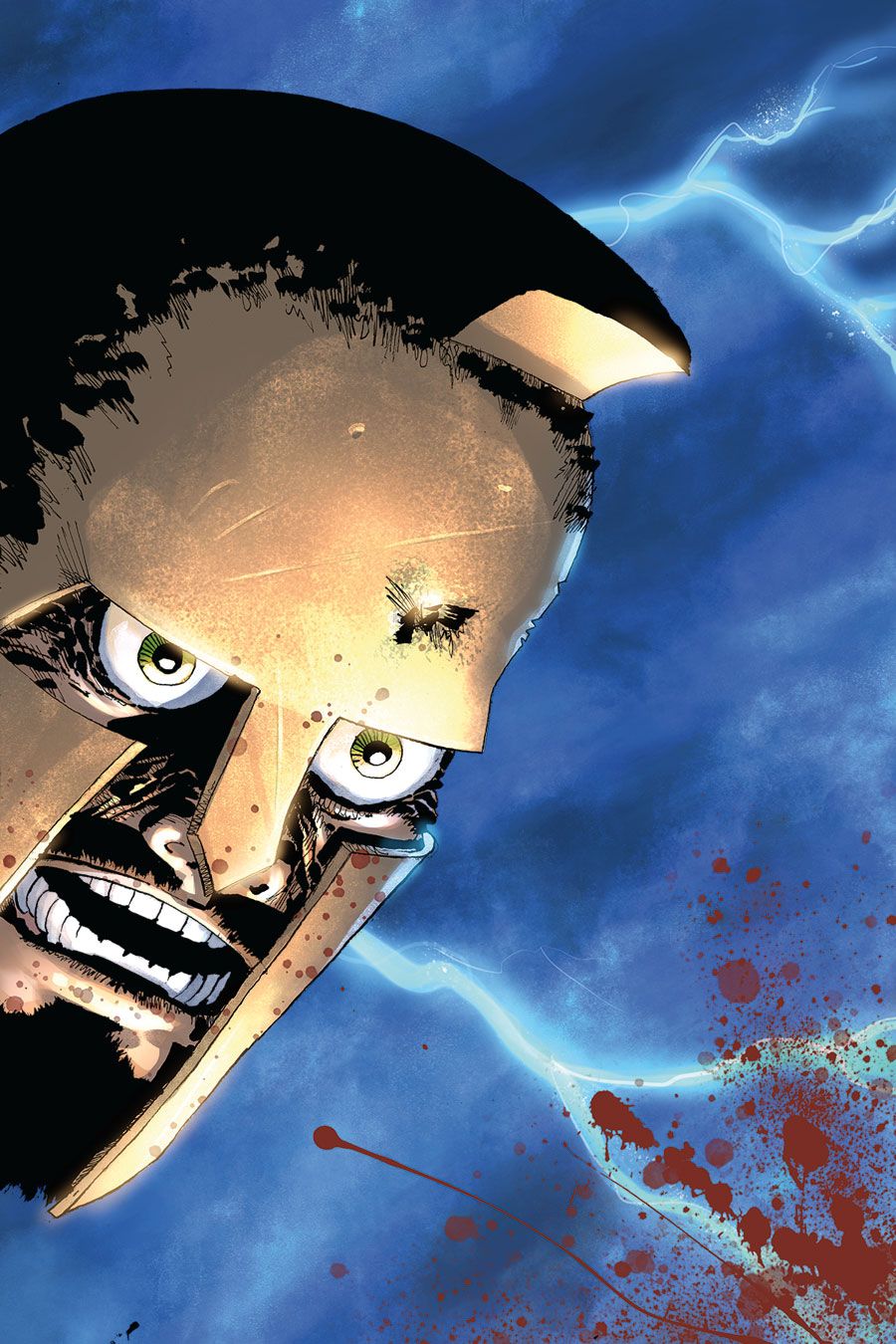A follow-up to Frank Miller's revered miniseries 300 has been discussed for years -- a sequel to the 300 film was even released in the interim, back in 2014 -- and now the comic book is officially on Dark Horse Comics' schedule, set to debut in April. Xerxes: The Fall of the House of Darius and the Rise of Alexander is a five-issue miniseries, set to pit the forces of Persian King Xerxes -- previously seen in 300 (and in history) -- against the Greeks and Alexander the Great.
Unlike DC Comics' recent Dark Knight III: The Master Race, Miller returns to the familiar position of both writing and drawing Xerxes, with Alex Sinclair on board as colorist. Like 300, it's steeped in world history, as depicted by Miller's distinct approach.
RELATED: Frank Miller’s 300 Prequel Will Finally Arrive Next Year
CBR spoke with Miller about Xerxes, how the series has evolved since he first discussed it publicly back in 2009, why Alexander the Great is the "emergent hero" of the story, returning to writing and drawing, his thoughts on the current comic book industry and the contemporary relevance of the Xerxes story.
CBR: Frank, you first spoke about a follow-up to 300 back in 2009, and I'm not sure how long you had been planning it before that. Now that Xerxes is coming out in 2018, is the story pretty much the same form when you envisioned it originally? Or has it evolved along the way?
Frank Miller: The history hasn't changed, but certainly my approach to it has evolved across time. It is a more expansive story than it originally was, because I've been shown how interconnected the story of Xerxes is. It began as a straight-out war story, and I think it involves much more about civilization; as well as all the warfare.
Looking back at the original 300, it stands as one of your most famous works to mainstream audiences in large part due to the success of the 2007 film. To you, as a creator, where do you see it in your body of work? How meaningful is it to you, 20 years later?
I first fell in love with the story when I was a little kid, seeing [1962 film The 300 Spartans] in the early '60s. I decided I would make a comic book of it when I was a professional at making comic books. Then I eventually did, and of course it went on to become Zack Snyder's movie, and they did a terrific job with it. I always thought, when I finished 300, that it was the entry point to more stories. I think history's a wonderful subject for comic books. Xerxes is a more expansive book that covers a wider range of history.
You've commented on the past about the Persian wars, and how much potential it holds for storytelling. With presumably dozens of stories you could tell, how did you arrive at the story being told in the Xerxes series?
There are pivotal figures that alter the course of history. Xerxes is one. He reformatted the world, and his empire was, at the time, unimaginably vast. It really looked like the House of Darius was to rule the world for all time. Then the Macedonians and Alexander came along and changed the rule.
This is a time where, in a relatively small region, the course of world events were determined over and over again; since Asia was a separate world, for all intents and purposes. The reign of Xerxes surpassed that of his own father, and it was an extraordinary event.
Page 2: [valnet-url-page page=2 paginated=0 text='The role of Alexander the Great, thoughts on the current comic book industry']
Let's talk the role Alexander the Great plays in this series. He's one of the more fascinating figures in history, and you've commented that he's the "emergent hero of the series" -- what was interesting to you about Alexander both in a historical sense, but also depicting him as a character in this story?
This is Xerxes' story. I guess you'd call Alexander an antagonist. The greater story of Alexander is yet to come. It's his role as it relates to Xerxes and the House of Darius that's important. Think of Alexander in this context as the wily opponent that is coming from the west.
Alexander transforms the world. There's Before Alexander, and there's After Alexander. And one era doesn't really look that much like what came before it.
As it was in 300, the theme throughout all of this is the hero. Alexander is absolutely, identifiably a hero. But the fascinating thing about him is that he also is the one who, rather than just having an endless collision between the east and the west, he's remarkable in that he embraces them over time.
This is the first time readers will see a full story from you that you both wrote and drew in a few years, since Holy Terror. How did that feel to you -- going back to what you're most famous for?
It feels like I'm home again! It feels great.
Your art style has evolved over the years, and the original 300 has a distinct style that people recognize. Are you looking to be fairly strictly visually consistent with what you did before, or experiment?
I always want to keep things moving, and learn from what I've done before, and everything else that's going on around. Xerxes is a wonderful opportunity for research. It was Geof Darrow that deserves credit for this wonderful observation: Things are always a lot weirder than you think they are when you really take a look at them. In my case, I've got to say that the history is always better looking than what you'd imagine it was.
Also visually, this series is colored by Alex Sinclair, who colored Dark Knight III and All-Star Batman and Robin, but this is his first time coloring your art, correct?
Yeah. It's really something. He's bringing a vibrant energy to it. It fits this story very well. He's a wonderful collaborator. He and I went over all kinds of references -- he just brings a terrific amount of energy to it.
Even though you're telling stories that took place hundreds of years ago, there's usually a relevance you can find in something like this; elements that look familiar. Given the weird world we've found ourselves in, what kind of newfound relevance does the Xerxes story have to you?
I don't know! I can't, in my wildest dreams, think of any way this could relate to a leader who has dreams of being a deity, or thought that they could overthrow more people when faced with world domination. So I can't imagine what you're talking about.
RELATED: Frank Miller Announces ‘Superman: Year One’-Style Story
Too far out there, I guess. Also, it's been neat to see that you've been much more active in comics lately after spending time in Hollywood. Between Xerxes, Dark Knight III, more projects with DC comics -- there been a lot more comics stuff from you. How have you enjoyed being back in the comics world more regularly, and what made now the right time to do i?
It feels absolutely great. It was just a matter of time being right, and brain being in the right shape.
In terms of the comics world in general, when you look at what's out there right now, are you finding yourself energized by what you're seeing other creators doing?
Oh yeah. I am. I won't go into a litany of everybody's names, but the two things that are most exciting is that the genre barriers have broken; comics of all kinds are now coming in, and they're able to stand on their own. It's not just guys in tights punching each other anymore. It's really an open system.
The other thing is that, in many places, comics have simply become more intentional. Forbidden Planet [comic book store chain first opened in London] in New York is no longer an aberration, it's actually competing with several other worthy competitors. Comics have become more international, and when I travel internationally, I notice that our influence is now reaching other countries. It's all become much healthier, more diverse.
Xerxes: The Fall of the House of Darius and the Rise of Alexander #1 is scheduled for release on April 4 fom Dark Horse Comics.




